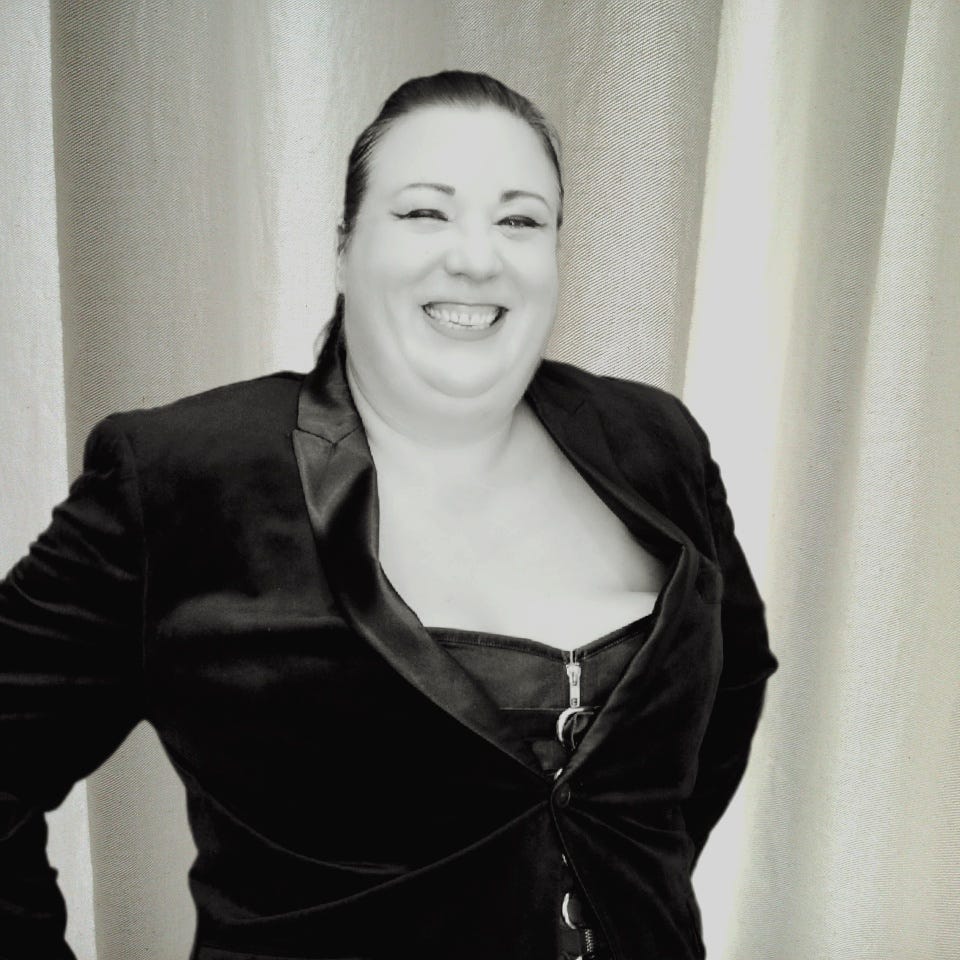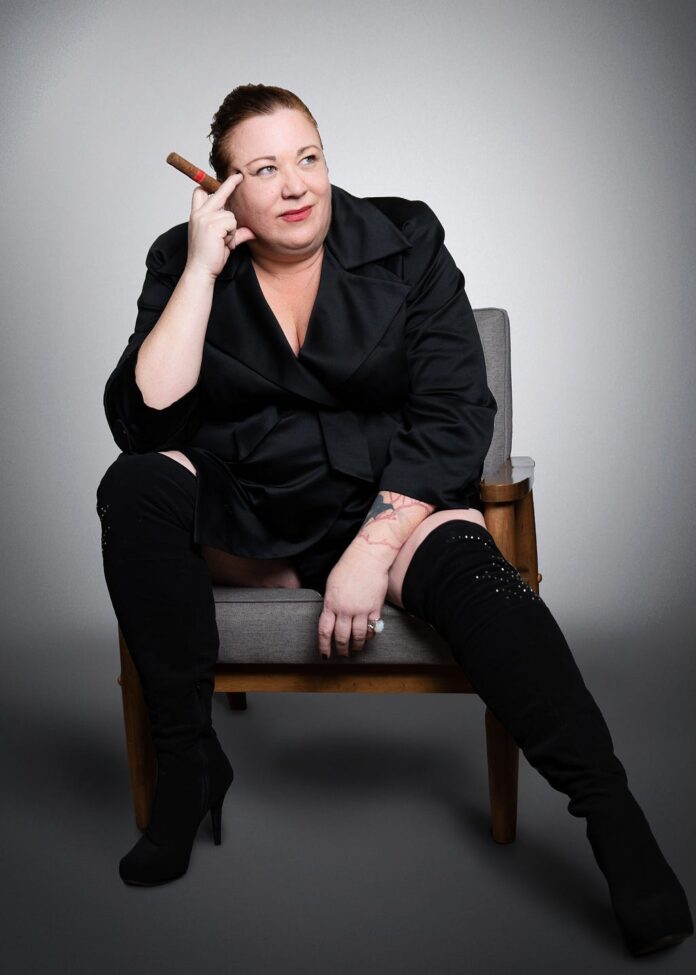Rebecca Blanton Of Auntie Vice Productions: How I Navigate Life With Bipolar Disorder, And How You Can Too
An Interview With Stephanie Greer
Track your own symptoms, responses to medication, triggers, etc. You are the only real expert on your bipolar.
Living with bipolar disorder presents a unique set of challenges. This condition can profoundly impact an individual’s personal, social, and professional life. But it’s crucial to note that countless individuals with bipolar disorder lead productive and successful lives, transforming their experiences into powerful narratives of strength and resilience. In a world where conversations about mental health are becoming more urgent yet still face stigma and misunderstanding, the timeliness of this series cannot be overstated. We aim to shed light on the realities, strategies, and triumphs of navigating life with this disorder. In this series, we are talking to individuals who have been diagnosed with bipolar disorder, who share their personal journeys, strategies, coping mechanisms, and expert advice to help others in similar situations. As a part of this interview series, I had the pleasure of interviewing Rebecca Blanton.
Rebecca Blanton is an award-winning writer and podcaster. Prior to this career, they were a respected policy researcher and head of a state agency. They have lived with Bipolar I for more than three decades.
Thank you so much for joining us in this interview series! We really appreciate the courage it takes to publicly share your story. Before we start, our readers would love to “get to know you” a bit better. Can you please give us your favorite “Life Lesson Quote”? Can you share how that was relevant to you in your life?
Everyone deserves respect and competent medical care. Doctors who are dismissive or don’t listen should be fired.
Let’s now shift to the main part of our discussion. Can you share what your journey with bipolar disorder has been like?
I began having symptoms of bipolar disorder when I entered puberty. At the time (the 1980s), doctors did not think kids could be depressed, let alone have a major psychiatric disorder. By the time I reached high school, I was having bouts of mania and suicidal ideation.
When I got to undergrad, I was treated for headaches with Wellbutrin and began seeing things. Additionally, I tried to kill myself. I sought treatment through my university’s health clinic. The first doctor told me the problem was I was bisexual and that ‘wasn’t a real thing.’ They then referred me to the coming out group I ran. The second doctor told me the problem was I was a Genetics major and ‘math and science are too hard for girls.’ He suggested changing my major to English would make all the symptoms go away.
I did what so many folks in this situation do and changed my major to Psychology. I gained a better understanding of different disorders and went in with the DSM IV and walked a psychiatrist through how my symptoms fit the diagnosis. He agreed with my assessment and started me on medication.
Over the next 20 years I was on a huge number of medications for bipolar disorder. Some worked better than others, but none could keep me stabilized for more than 6 months. Most doctors were patronizing at best and openly hostile most of the time. After discovering a doctor has significantly falsified medical records and subjected me to a sexual assault as “necessary treatment,” I stopped seeing western medical doctors.
I started seeing alternative medical practitioners and began a protocol with supplements, energy work, diet, and mindfulness. For the past decade I have not had a major mood swing. I recently had an EEG (unrelated to bipolar disorder) and was told my brain is still ‘very bipolar’ in its functioning although my current physician of 7 years has never seen me exhibit symptoms.
Was there a turning point for you when things started to change for the better? Can you please share a story?
When I stopped using typical western medical treatments, I experienced a huge improvement in symptoms. I have been pressured, shamed, and told that the ‘only effective treatments’ of bipolar are pharmaceuticals. While they help many of my fellow bipolar people, they were never very effective for me. I respond well to a wide variety of herbal and ‘Eastern’ medicine. Luckily, this also applies to my bipolar illness.
The most surprising was the control of my depression. For most of my life, my depressive spells were very hard to treat. I have been on a variety of tricyclic antidepressants, SSRIs and SNIRs with little improvement in symptoms. I had three suicide attempts in 20 years using prescription pharmaceuticals. When I started a more holistic approach to treating bipolar I was in a deep depressive phase. I was given rhodiolia rosea, an over the counter adaptogen. I went from suicidal ideations to baseline “okay” in three days. I have never responded so quickly or well to a pharmaceutical antidepressant.
Who are some of the important people in your life who have been on this journey with you? How have they either helped you or made things harder?
The most helpful group of folks I have worked with was a peer-to-peer mood support group. This group does not allow medical professionals of any kind to ‘facilitate’ or work with the group since there are a large number of us who have had very negative experiences with doctors. I resisted joining a peer support group for years! Talking to folks going through this journey was some of the most healing and most grounding work I have had.
Very few other people understand bipolar enough to be helpful. Even the most caring people in my life have been unhelpful or hurtful when it comes to dealing with the disorder.
How has your experience been getting treatment? What do you wish mental health professionals understood better about navigating bipolar disorder?
Ha! My experiences have been horrible!! I have yet to meet a male psychiatrist or therapist who is useful at all. Every MD I have worked with believes they are a demi-god who gives commands from on-high and patients are just supposed to follow directions.
The vast majority of medical doctors I have worked with believe that bipolar is simply a chemical imbalance in the brain and that taking a pill or 10 of them a day should ‘fix’ the problem. I have had severe side effects (vomiting upwards of 10 times a day, 60 pound weight gain in 3 months, feeling completely numb) and every time I asked to change medications I was told that I was being ‘difficult’ or ‘noncompliant’ and should learn to tolerate the ‘minor side effects.
Second, every mental healthcare professional I work with has a deep belief that being numb is ‘successful’ treatment of bipolar disorder. If I wasn’t suicidal or manic, it is a success! This meant for a large part of my marriage, I felt nothing for my wife. Treatments making me emotionally numb and depressing my sex drive contributed significantly to my divorce. Connection is key for successful bipolar treatment. The current medical models are contrary to this.
Treating physicians also have no clue about female sexuality. When medications depressed my sex drive, caused vaginal dryness, and other sexual side effects arose, they were always dismissed an ‘minor’ or ‘unimportant for successful treatment.’ It is not okay to tell people with mental illnesses they must give up a key aspect of their humanness for ‘treatment.’
What are a few of the biggest misconceptions and myths out there about bipolar disorder that you would like to dispel?
Bipolar does not just require pharmaceuticals. While I am extremely lucky I can treat 90 percent of my disorder with acupuncture, mindfulness, and supplements (I still take Lexapro for anxiety), other people will be helped by more holistic treatments. Doctors need to rethink their approach to psychiatry.
And, don’t sexually assault your patients.

Fantastic. Here is the main question of our interview. What are 5 things you learned from your journey that you think other people navigating life with bipolar disorder or their family would benefit from knowing?
1 . You deserve care and respect.
2 . If a treatment is not working for you, you deserve alternatives.
3 . This is a lifelong journey.
4 . This is a cyclical disease. If your doctor just keeps piling on drugs without considering if the older medications are still needed, find a new doctor.
5 . Track your own symptoms, responses to medication, triggers, etc. You are the only real expert on your bipolar.
How has living with bipolar disorder affected your relationships, both romantic and platonic? Any advice for others who are navigating relationships while managing the condition?
It is important to communicate with your partner(s) about how you experience bipolar disorder. Most will have no idea what you are going through. It takes time to put words to your own experience, so be patient with yourself and your partner as you learn to communicate about the disease.
Additionally, it is useful to have a partner join a “friends and family” support group at least for a little while. Being a partner to someone with mood disorders can be challenging. Having a space your partner can process their feelings, grief, anger, and frustration that does not involve you makes for a much healthier situation.
Are there any books, podcasts, or other resources that have helped you understand or manage your condition better?
I love The Power of Different by Gail Saltz. It really helped me understand my brain.
The Monster Under the Bed: Sex, Depression, and the Conversations We are Not Having by JoEllen Notte is great when it comes to understanding the depressive side of bipolar. Her blog RedHeadBedHead is also great!
We are very blessed that some very prominent names in Business, VC funding, Sports, and Entertainment read this column. Is there a person in the world, or in the US with whom you would love to have a private breakfast or lunch, and why? He or she might just see this if we tag them. 🙂
Dr. Roxane Gay, Dr. Tressie Cottom, of Lizzo
These women have done more in their work to help me understand my own relationship to my body than anyone. Their work has been critical in my personal healing.
How can our readers further follow your work online?
Blog: www.LoveLettersToAUnicorn.com
Website: www.AuntieVice.com
Podcast: www.FatChicksOnTop.com
I am at @AuntieVice on most social platforms.
Both the blog and podcast feature work about living with mental illness and relationships.
Thank you for your time and thoughtful answers. I know many people will gain so much from hearing this.
About The Interviewer: Stephanie Greer, PhD is the Co-founder and CEO of Akin Mental Health — a company dedicated to guiding families on their journey supporting a loved one with mental health challenges like bipolar disorder, schizophrenia and severe depression. Stephanie is passionate about this topic from her own personal experience growing up with a mother who struggled with bipolar 1 disorder and found a path forward to overcome the obstacles and live well. Stephanie’s professional experience includes a doctorate in neuroscience as well as design research roles at Hopelab and Apple. Stephanie brings this personal passion together with her world-class science and technology background to support families across the US in their personal journeys supporting loved ones with mental illness. To learn more about Akin Mental Health and join our community, visit us at akinmh.com.
Rebecca Blanton Of Auntie Vice Productions: How I Navigate Life With Bipolar Disorder, And How You… was originally published in Authority Magazine on Medium, where people are continuing the conversation by highlighting and responding to this story.


